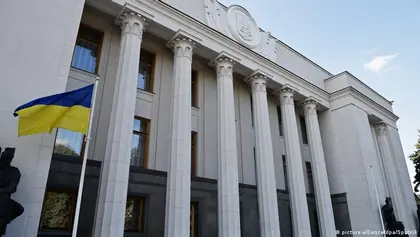The Verkhovna Rada has earmarked Hr.1.69 trillion ($47 billion), or 22 percent of Ukraine’s annual GDP, for defense in its second wartime budget. The 2024 national budget passed by 276 votes. As was the case last year, the lawmakers did it ahead of the Nov. 20 deadline set by law.
Roksolana Pidlasa, chairperson of the Budget Committee, told Kyiv Post in a comment that the draft budget bill had only been slightly amended for the second reading, and that each extra hryvnia would go to fund the country’s defense.
JOIN US ON TELEGRAM
Follow our coverage of the war on the @Kyivpost_official.
Main changes in the final draft of the budget bill
Defense expenditures had been expected to increase to Hr.2 trillion ($55 billion) but stayed at Hr.1.69 trillion ($47 billion). In the draft prepared for the first reading the proposed allocations for defense were increased by Hr.300 billion ($8.3 billion).
“The expenditures for the national security and defense sector are covered exclusively by domestic revenues: taxes, customs payments, state-owned companies’ dividends, privatization and government bonds,” said Pidlasa.
According to her, Hr.43 billion ($1.19 billion) of the total defense allocations will go to fund the development and production of UAVs and another Hr.43 billion would go to fund the domestic production of weapons and ammunition.
She noted a change in the defense spending-to-GDP ratio from 21.6 percent to 22.1 percent, explaining that by the second reading the GDP growth forecast for 2024 had changed from 5 to 4.6 percent.

ISW Russian Offensive Campaign Assessment, January 21, 2025
In her previous interview Pidlasa told Kyiv Post about the government’s plans to adjust its forecast to the IMF’s, but said that the latter’s forecasts are normally conservative and should not be relied upon completely.
In the draft bill prepared for the second reading, the authors also reduced the inflation outlook from 10.8 percent to 9.7 percent and the expected exchange rate from Hr.41.4 to 40.7 per each US dollar.
Pidlasa is sure that even if the war ends next year and the government discontinues the practice of “manual control” of economic processes in the country, Ukrainians should not fear hyperinflation with exorbitant price hikes.
“The cessation of hostilities will certainly trigger a lot of ‘delayed spending’: businesses and individual citizens will spend more and increasing demand will cause prices to grow, but there are no grounds to expect exorbitant price hikes or hyperinflation,” she said.
According to her, an increase in state budget revenues by Hr.22.2 billion ($620 million) to Hr.1.768 trillion ($49 billion) made it possible to reduce the budget deficit to 1.57 trillion ($44 billion). She attributed it to increased revenues from VAT and customs duties on imported goods, and taxes on bank incomes and rent.
She noted that all the 2024 budget outlays except those for defense would remain in the budget deficit section and would be partially covered by external borrowings to the tune of Hr.1.67 trillion ($46 billion), placement of government bonds Hr.525.9 billion ($14.6 billion), and revenues from privatization Hr.4 billion ($110 million).
“We reduced external borrowings from $42.9 billion to $41 billion at the IMF requirement and covered the difference at the expense of increasing domestic borrowings by Hr.81.4 billion ($2.26 billion),” explained Yaroslav Zhelezniak of the Holos faction.
Importantly, the funding of all social payments, indexation included, which amount to Hr.470 billion ($13 billion), will not be cut.
“Pensions, salaries to healthcare employees and teachers and welfare programs are secured expenditure items of the national budget and they will not be cut. Besides, an indexation of pensions is planned for March 1. All the payments our citizens receive from the state will be indexed next year,” Pidlasa said on Thursday.
She said that twice more funds than this year – almost Hr.15 billion ($416 million) – would be allocated to support war veterans, including Hr.1 billion ($28 million) for prosthetics. Hr.573 million ($15.9 million) of this sum was redirected from the construction of the Holodomor Museum. Spending on healthcare and education would total Hr.201 billion ($5.4 billion) and Hr.69 billion ($1.91 billion) respectively.
Pidlasa added that the Pension Fund’s deficit would also be covered and that next year the long-awaited reform of the pay-as-you-go pension system would be launched.
“A good example is the reform of the pay-as-you-go pension system, which is not very much talked about, unlike the accumulative system. In essence, it is designed to raise pensions payable to the poorest pensioners and cut astronomical pensions of retired public servants and other officials,” explained Pidlasa.
She said that internally displaced persons that number nearly two million would continue to receive payments. For that the lawmakers earmarked Hr.57.6 billion ($1.6 billion)
They also allocated Hr.1 billion ($28 million) for demining farmland and, in agreement with the Finance Ministry, Hr.1 billion as an additional subvention for building bomb shelters in hospitals.
You can also highlight the text and press Ctrl + Enter










